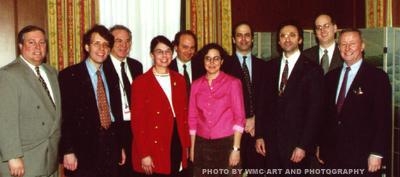Congratulations to the six Weill Cornell investigators who have been honored with election to the prestigious American Society for Clinical Investigation (ASCI): Dr. Ethel Cesarman, associate professor of pathology; Dr. Andrew Dannenberg, the Henry R. Erle M.D.–Roberts Family Professor of Medicine; Dr. Steven Goldman, professor of neurology and neuroscience; Dr. Lionel Ivashkiv, associate professor of medicine; Dr. David Nanus, associate professor of medicine and urology; and Dr. Shahin Rafii, associate professor of medicine (Division of Hematology-Oncology).

At the reception honoring Weill Cornell's six new members of the American Society for Clinical Investigation are (from left) ASCI executive director Scott Feigelstein, Dr. Lionel Ivashkiv, Dr. Herbert Pardes, Dr. Babette Weksler, Dr. Steven Goldman, Dr. Ethel Cesarman, Dr. Andrew Dannenberg, Dr. Shahin Rafii, Dr. David Nanus, and Dr. Antonio Gotto.
The six new ASCI members were honored at a special reception co-hosted by Dr. Antonio Gotto, dean of Weill Medical College, and Dr. Herbert Pardes, president and CEO of NewYork-Presbyterian Hospital, on April 10. Representing ASCI were executive director Scott Feigelstein and Weill Cornell's Dr. Babette Weksler, professor of medicine, who serves as Weill Cornell's institutional representative with the ASCI.
"Having six new members elected to the ASCI in one year is highly unusual for any research institution," said Dr. Gotto. "This recognition for Weill Cornell is indicative of the continuing growth and high quality of our research programs."
The new ASCI members have impressive records of accomplishment in their respective areas of research.
Dr. Cesarman is one of the discoverers of KSHV (or HHV-8), the Kaposi's sarcoma–associated virus, which is now recognized as the causal agent of Kaposi's sarcoma. Her investigations have shown that this virus is also associated with a rare form of malignant lymphoma (primary effusion lymphoma) that occurs primarily in AIDS patients. Her group continues to study the molecular mechanisms involved in transformation of endothelial cells and lymphoid cells by KSHV in the pathobiology of Kaposi's sarcoma and malignant lymphoma.
Dr. Dannenberg has made major contributions to the study of cyclooxygenase-2 (COX-2), an enzyme that plays a role in both inflammation and carcinogenesis. In addition to providing evidence that oncogenes, tumor suppressor genes, and tumor promoters modulate COX-2 gene expression, his research group has helped to elucidate the signal transduction pathways that regulate the expression of this gene. This work has been complemented by a series of studies in which novel approaches to suppressing the activation of COX-2 transcription were developed. Based on the preclinical work of his laboratory, several clinical trials are currently ongoing utilizing selective COX-2 inhibitors.
Dr. Goldman's research at Weill Cornell is concerned with neural plasticity, regeneration and brain repair, with a special focus on neural stem and progenitor cells. His lab was the first to identify and isolate these cells from the adult human brain and continues to investigate both the basic biology and potential therapeutic utility of these cells.
Dr. Ivashkiv is based at the Hospital for Special Surgery, where his research has focused on the analysis of cytokine signal transduction and its role in the pathogenesis of inflammatory or autoimmune diseases such as rheumatoid arthritis (RA). His work aims to understand how multiple pro- and anti-inflammatory factors interact to regulate inflammation, and to elucidate the molecular bases for these interactions. Most recently, his studies of inhibition of signaling by anti-inflammatory cytokines have led to formulation and testing of a novel hypothesis that cytokine balance in RA is not regulated solely at the level of cytokine expression, but that blockade of signaling by anti-inflammatory cytokines, such as IL-10 and TGFb, plays an important role as well.
Dr. Nanus is medical director of the genitourinary oncology program in the Division of Hematology-Oncology in the Department of Medicine. In addition, he is co-director of the urological oncology research laboratory in the Department of Urology. His areas of research have included the molecular basis of kidney cancer and the role of retinoids in the treatment of patients with kidney cancer. He is best known for studies on the contribution of cell-surface peptidases in the development and progression of kidney cancer. Recently, his group has defined the involvement of neutral endopeptidase in prostate cancer progression.
Dr. Rafii's research focuses on studying the complex biology of stem cell survival and trafficking in the context of endothelial cells. He has demonstrated that transendothelial migration of megakaryocytes is the key event in platelet production. He has also pioneered the concept that, in addition to pre-existing endothelial cells, marrow-derived endothelial and hematopoietic precursor cells can be mobilized and be incorporated into the newly formed tumor vessels. Inhibition of mobilization and incorporation of marrow-derived cells results in inhibition of growth of certain tumors. In a model where primary human leukemias were xenotransplanted into immunocompromized mice, he has demonstrated that inhibition of both autocrine and VEGF/VEGFR2 angiogenic pathways are essential to inhibit leukemic cell proliferation. Based on these findings, two anti-angiogenic factors targeting VEGFR2 will be tested in clinical trials to examine the efficacy of these agents for the treatment of human leukemias.

